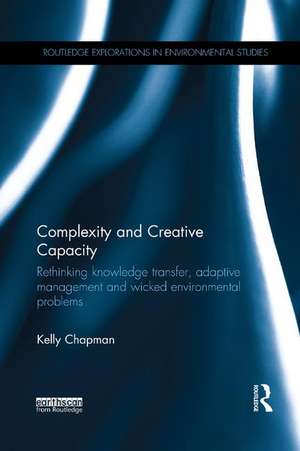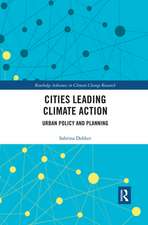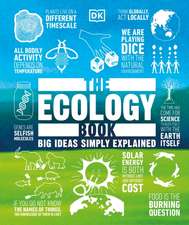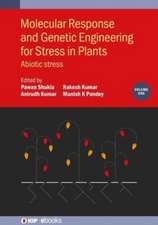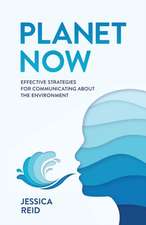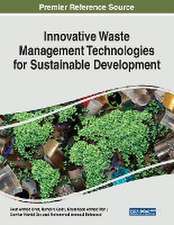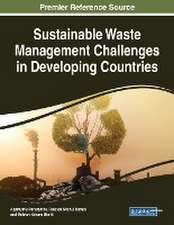Complexity and Creative Capacity: Rethinking knowledge transfer, adaptive management and wicked environmental problems: Routledge Explorations in Environmental Studies
Autor Kelly Chapmanen Limba Engleză Paperback – 8 dec 2017
This book uses complexity theory to surface and challenge the deeply held cultural assumptions that shape how we think about reality and knowledge. In doing so it shows how our traditional approaches to generating and applying knowledge may be paradoxically exacerbating some of the ‘wicked’ environmental problems we are currently facing. The author proposes an innovative and compelling argument for rejecting old constructs of knowledge transfer, adaptive management and adaptive capacity. The book also presents a distinctively coherent and comprehensive synthesis of cognition, learning, knowledge and organizing from a complexity perspective. It concludes with a reconceptualization of the problem of knowledge transfer from a complexity perspective, proposing the concept of creative capacity as an alternative to adaptive capacity as a measure of resilience in socio-ecological systems.
Although written from an environmental management perspective, it is relevant to the broader natural sciences and to a range of other disciplines, including knowledge management, organizational learning, organizational management, and the philosophy of science.
| Toate formatele și edițiile | Preț | Express |
|---|---|---|
| Paperback (1) | 446.53 lei 43-57 zile | |
| Taylor & Francis – 8 dec 2017 | 446.53 lei 43-57 zile | |
| Hardback (1) | 1056.28 lei 43-57 zile | |
| Taylor & Francis – 10 noi 2015 | 1056.28 lei 43-57 zile |
Din seria Routledge Explorations in Environmental Studies
-
 Preț: 281.77 lei
Preț: 281.77 lei -
 Preț: 243.62 lei
Preț: 243.62 lei -
 Preț: 288.87 lei
Preț: 288.87 lei -
 Preț: 294.72 lei
Preț: 294.72 lei -
 Preț: 326.82 lei
Preț: 326.82 lei -
 Preț: 310.88 lei
Preț: 310.88 lei -
 Preț: 310.29 lei
Preț: 310.29 lei -
 Preț: 326.49 lei
Preț: 326.49 lei -
 Preț: 311.41 lei
Preț: 311.41 lei -
 Preț: 311.41 lei
Preț: 311.41 lei -
 Preț: 279.47 lei
Preț: 279.47 lei -
 Preț: 309.12 lei
Preț: 309.12 lei -
 Preț: 378.44 lei
Preț: 378.44 lei -
 Preț: 416.22 lei
Preț: 416.22 lei -
 Preț: 444.62 lei
Preț: 444.62 lei - 42%
 Preț: 234.90 lei
Preț: 234.90 lei -
 Preț: 480.62 lei
Preț: 480.62 lei - 12%
 Preț: 325.34 lei
Preț: 325.34 lei -
 Preț: 443.65 lei
Preț: 443.65 lei - 18%
 Preț: 1056.28 lei
Preț: 1056.28 lei -
 Preț: 442.50 lei
Preț: 442.50 lei -
 Preț: 461.50 lei
Preț: 461.50 lei -
 Preț: 421.63 lei
Preț: 421.63 lei -
 Preț: 449.41 lei
Preț: 449.41 lei - 18%
 Preț: 1060.52 lei
Preț: 1060.52 lei - 18%
 Preț: 1109.99 lei
Preț: 1109.99 lei - 25%
 Preț: 852.63 lei
Preț: 852.63 lei -
 Preț: 389.38 lei
Preț: 389.38 lei - 18%
 Preț: 699.99 lei
Preț: 699.99 lei - 15%
 Preț: 418.51 lei
Preț: 418.51 lei -
 Preț: 416.22 lei
Preț: 416.22 lei -
 Preț: 407.57 lei
Preț: 407.57 lei - 18%
 Preț: 1056.28 lei
Preț: 1056.28 lei - 26%
 Preț: 846.09 lei
Preț: 846.09 lei -
 Preț: 438.30 lei
Preț: 438.30 lei - 15%
 Preț: 423.09 lei
Preț: 423.09 lei -
 Preț: 448.44 lei
Preț: 448.44 lei - 13%
 Preț: 296.95 lei
Preț: 296.95 lei - 18%
 Preț: 1167.71 lei
Preț: 1167.71 lei - 16%
 Preț: 65.03 lei
Preț: 65.03 lei - 31%
 Preț: 767.88 lei
Preț: 767.88 lei
Preț: 446.53 lei
Nou
Puncte Express: 670
Preț estimativ în valută:
85.44€ • 89.45$ • 70.70£
85.44€ • 89.45$ • 70.70£
Carte tipărită la comandă
Livrare economică 07-21 aprilie
Preluare comenzi: 021 569.72.76
Specificații
ISBN-13: 9780815395393
ISBN-10: 0815395396
Pagini: 256
Ilustrații: 22 Illustrations, black and white
Dimensiuni: 156 x 234 x 18 mm
Greutate: 0.39 kg
Ediția:1
Editura: Taylor & Francis
Colecția Routledge
Seria Routledge Explorations in Environmental Studies
Locul publicării:Oxford, United Kingdom
ISBN-10: 0815395396
Pagini: 256
Ilustrații: 22 Illustrations, black and white
Dimensiuni: 156 x 234 x 18 mm
Greutate: 0.39 kg
Ediția:1
Editura: Taylor & Francis
Colecția Routledge
Seria Routledge Explorations in Environmental Studies
Locul publicării:Oxford, United Kingdom
Public țintă
Postgraduate and UndergraduateCuprins
1. Introduction 2. Unearthing Assumptions: The Co-evolution of Western Science and Philosophy 3. Unravelling Paradox: Mathematical Logic and Orders of Change 4. Filling the ‘Hole’: Non-linearity, Chaos and Complex Self-organising Systems 5. Complexity and Creative Capacity: From a Newtonian to a Complexity Reality 6. Through the Complexity Lens: Cognition, Learning and Organising 7. Implications: Rethinking Science, Knowledge Transfer and Adaptive Management
Recenzii
"The main obstacle to sustainability is not a lack of knowledge or options; it’s tackling today’s problems with yesterday’s paradigm. In this book, Chapman explores a history of ideas that set the stage for today’s emerging concepts of complexity and creative capacity, and show the way towards crucial transformations in environmental science, policy, and management. Beyond exploration, she offers her own vivid insights and key strategies for putting complex thinking into action." – Jennifer Wells, California Institute of Integral Studies, San Francisco, USA, author of Complexity and Sustainability
"This is a well-written, thought-provoking gem of a book, highly recommended for all in the Impact Assessment field
who are doing more than simply assessing the impacts of proposals but striving to change our planning discourse towards a more systemic approach. It provides a cogent argument for an alternative way of thinking about and framing our environmental challenges. It should be especially welcomed by those social scientists who believe that many of the barriers to environmental policy change are due to the inability of environmental scientists and managers to understand the social context of stakeholder engagement, knowledge transfer and decision-making, within a systems paradigm. The structure assists to build the reader’s knowledge of the complex, inter-disciplinary subject matter in a coherent step-by-step manner. Take note though that for neophytes in philosophy, it requires some focussed, quality reading time to take it all in, let alone begin to apply it. This book should become required reading for all in the broader socio-economic, development and environmental management fields." – Nicholas King, Impact Assessment and Project Appraisal
"This is a well-written, thought-provoking gem of a book, highly recommended for all in the Impact Assessment field
who are doing more than simply assessing the impacts of proposals but striving to change our planning discourse towards a more systemic approach. It provides a cogent argument for an alternative way of thinking about and framing our environmental challenges. It should be especially welcomed by those social scientists who believe that many of the barriers to environmental policy change are due to the inability of environmental scientists and managers to understand the social context of stakeholder engagement, knowledge transfer and decision-making, within a systems paradigm. The structure assists to build the reader’s knowledge of the complex, inter-disciplinary subject matter in a coherent step-by-step manner. Take note though that for neophytes in philosophy, it requires some focussed, quality reading time to take it all in, let alone begin to apply it. This book should become required reading for all in the broader socio-economic, development and environmental management fields." – Nicholas King, Impact Assessment and Project Appraisal
Descriere
This book uses complexity theory to show how our traditional approaches to generating and applying knowledge may be paradoxically exacerbating some of the ‘wicked’ environmental problems we are currently facing.
